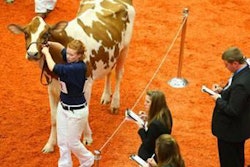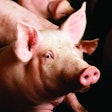The U.S. Food and Drug Administration has released a new Compliance Policy Guide (CPG) for its field staff on actions they intend to take when finding Salmonella contamination in food for animals. Under this new guide, the FDA will be able to target its resources more effectively to protect the health of both animals and humans, according to the agency.
For livestock and horse feeds, the CPG outlines a risk-based enforcement policy for animal feed that is contaminated with Salmonella, focusing on the strains that are capable of causing disease in the animal for which the food is intended. The CPG provides examples of Salmonella strains that have been reported to cause disease in a specific animal species (for example, swine feed contaminated with Salmonella Choleraesuis.)
Any pet food or pet food ingredient contaminated with Salmonella is considered potentially harmful to health if it isn’t intended to undergo a subsequent treatment to kill bacteria. Pet foods include dog and cat foods, aquarium fish foods, treats, chews, nutritional supplements and other pet products. The FDA maintains a zero-tolerance policy for Salmonella in pet food because it can pose risks to human health when people who are “at-risk” (children, the elderly and individuals with compromised immune systems) come into direct contact with contaminated pet food.
Because people are much less likely to come into direct contact with animal feeds, the FDA is most concerned about the strains of Salmonella that are capable of causing disease in the animal for which the feed is intended.
In concert with the new CPG, the FDA also revoked an Advisory Opinion from 1967 that described a zero-tolerance policy for any strain of Salmonella in certain animal feed ingredients, even if it was not capable of causing foodborne illness, in favor of the risk-based policy in the CPG. The FDA also withdrew an earlier Compliance Policy Guide that covered only dry dog food. Dry dog food is now included in the scope of the new CPG. The FDA continues to have a zero-tolerance policy with regard to Salmonella in dry dog food, as well as other pet foods.















